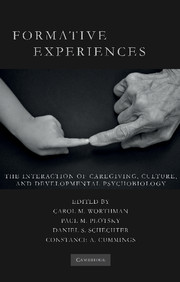Book contents
- Frontmatter
- Contents
- List of Figures
- List of Tables
- List of Contributors
- Foreword by Robert Sapolsky
- Preface
- List of Abbreviations
- Introduction
- SECTION ONE HISTORICAL, CROSS-CULTURAL, AND DEVELOPMENTAL SCIENCE PERSPECTIVES
- SECTION TWO HOW EXPERIENCE INTERACTS WITH BIOLOGICAL DEVELOPMENT
- SECTION THREE FORMATIVE RELATIONSHIPS WITHIN AND ACROSS GENERATIONS
- SECTION FOUR SOCIAL AND CULTURAL CONTEXTS OF CHILDHOOD DEVELOPMENT – NORMATIVE SETTINGS, PRACTICES, AND CONSEQUENCES
- SECTION FIVE FEAR, FUN, AND THE BOUNDARIES OF SOCIAL EXPERIENCE
- 15 Ethnographic Case Study: Anak PKI – A Longitudinal Case Study of the Effects of Social Ostracism, Political Violence, and Bullying on an Adolescent Javanese Boy
- Commentary
- Commentary
- 16 The Evolution of Social Play
- 17 Ethological Vignette: Social Stress as a Formative Experience – Neurobiology of Conditioned Defeat
- Commentary
- Commentary
- Commentary
- 18 The Basic Affective Circuits of Mammalian Brains: Implications for Healthy Human Development and the Cultural Landscapes of ADHD
- SECTION SIX PUBLIC HEALTH, EDUCATION, AND POLICY IMPLICATIONS
- Index
- References
15 - Ethnographic Case Study: Anak PKI – A Longitudinal Case Study of the Effects of Social Ostracism, Political Violence, and Bullying on an Adolescent Javanese Boy
Published online by Cambridge University Press: 26 May 2010
- Frontmatter
- Contents
- List of Figures
- List of Tables
- List of Contributors
- Foreword by Robert Sapolsky
- Preface
- List of Abbreviations
- Introduction
- SECTION ONE HISTORICAL, CROSS-CULTURAL, AND DEVELOPMENTAL SCIENCE PERSPECTIVES
- SECTION TWO HOW EXPERIENCE INTERACTS WITH BIOLOGICAL DEVELOPMENT
- SECTION THREE FORMATIVE RELATIONSHIPS WITHIN AND ACROSS GENERATIONS
- SECTION FOUR SOCIAL AND CULTURAL CONTEXTS OF CHILDHOOD DEVELOPMENT – NORMATIVE SETTINGS, PRACTICES, AND CONSEQUENCES
- SECTION FIVE FEAR, FUN, AND THE BOUNDARIES OF SOCIAL EXPERIENCE
- 15 Ethnographic Case Study: Anak PKI – A Longitudinal Case Study of the Effects of Social Ostracism, Political Violence, and Bullying on an Adolescent Javanese Boy
- Commentary
- Commentary
- 16 The Evolution of Social Play
- 17 Ethological Vignette: Social Stress as a Formative Experience – Neurobiology of Conditioned Defeat
- Commentary
- Commentary
- Commentary
- 18 The Basic Affective Circuits of Mammalian Brains: Implications for Healthy Human Development and the Cultural Landscapes of ADHD
- SECTION SIX PUBLIC HEALTH, EDUCATION, AND POLICY IMPLICATIONS
- Index
- References
Summary
I am told not to think about the past, but I still do, and (when I do), my emotions intensify…I was a quiet person before, so many people picked fights with me. Now (that I am different), the voices tell me to go back (and face) that past world.
(Joko, 2006 interview)What is a “healthy” psychological response to long-term discrimination, oppression, social ostracism, and discriminatory violence, enacted not only by a state apparatus but also through the agency of local community members? How should notions of revenge and retribution be viewed in this context? And how does such a cultural environment affect a child's neurobiological and developmental changes?
These are some of the questions explored in the following case study of a central Javanese boy named Joko and his transition from childhood to early adulthood.
CASE STUDY
Joko was a patient of Dr. Mahar Agusno (MA), a Javanese psychiatrist with whom one of the authors, Robert Lemelson (RL), has been conducting ongoing research on neuropsychiatric disorders in Indonesia. Joko was referred to MA by the staff of the Catholic orphanage where his parents had placed him at age 12. The clinical interviews with Joko were initially conducted by MA, his wife Ninik Supartini (NS), and RL and were recorded on video. As the research progressed, RL, usually accompanied by NS (who also became Joko's counselor), conducted ethnographic person-centered interviews with Joko, his family, social workers, and the orphanage staff, as well as children from Joko's home village and other members of his community.
- Type
- Chapter
- Information
- Formative ExperiencesThe Interaction of Caregiving, Culture, and Developmental Psychobiology, pp. 378 - 389Publisher: Cambridge University PressPrint publication year: 2010
References
- 4
- Cited by



